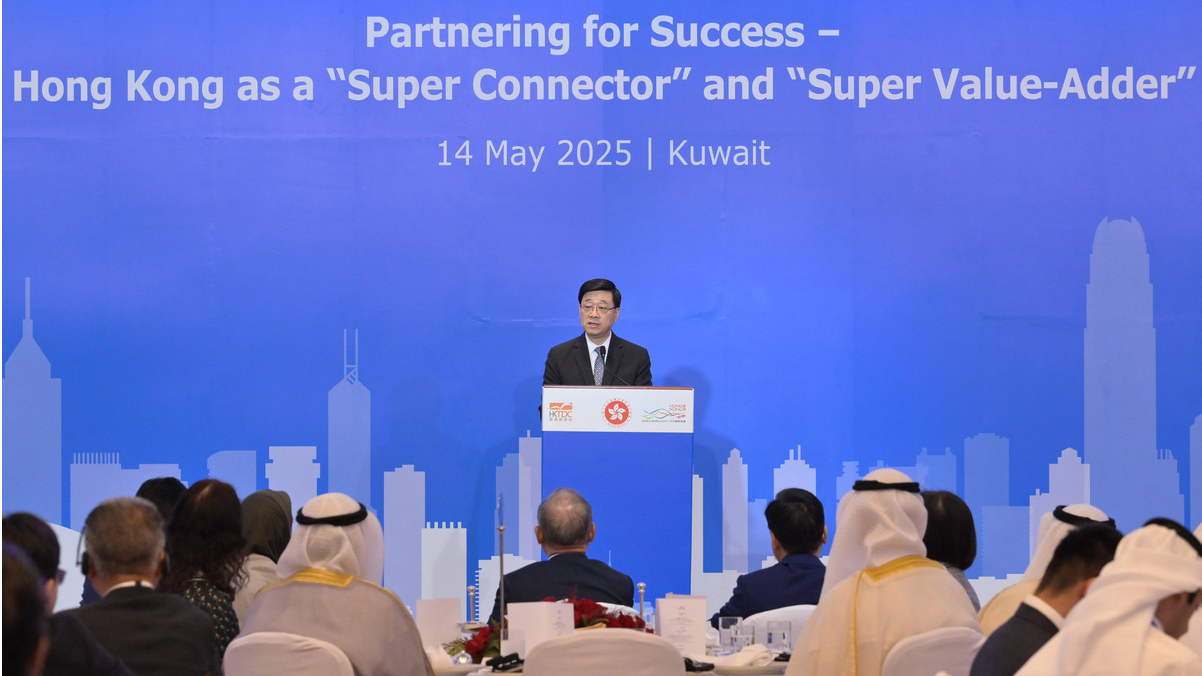
Hong Kong Chief Executive John Lee Ka-chiu on Wednesday celebrated a new milestone in Hong Kong-Kuwait relations after the two sides inked 24 memoranda of understanding (MoUs) and cooperation agreements.
The deals were signed after Lee and his 50-strong delegation landed in Kuwait on Monday evening from Qatar — where they also secured multiple trade and collaboration pacts during a two-day stay.
Lee announced the achievement in a social media post shortly after a business luncheon in Kuwait hosted by the Hong Kong Special Administrative Region government and the Hong Kong Trade Development Council (HKTDC), and co-organized by the Kuwait Direct Investment Promotion Authority and the Kuwait Chamber of Commerce and Industry.
READ MORE: Reform-minded Kuwait has much to offer to Hong Kong
He said the agreements span trade, investment, financial services, aviation, maritime industries, higher education, legal services, and sports.
As part of the strengthened partnership, Lee said the Hong Kong and Kuwaiti customs authorities will commence negotiations on the mutual recognition of respective Authorised Economic Operator Programmes, creating a smoother international trade environment for businesses.
Airport Authority Hong Kong signed a new MoU with Kuwait Airways, aimed at enhancing air connectivity and advancing talent development.
Earlier, Lee highlighted the complementary strengths shared by Hong Kong and Kuwait, calling for enhanced cooperation in key sectors amid global economic uncertainties.
Following discussions with the Kuwait Direct Investment Promotion Authority, Lee noted significant opportunities in financial services — including securities, asset management, and wealth management — positioning Hong Kong as an ideal partner for Kuwait’s economic diversification.
He also emphasized Hong Kong’s leadership in green finance, citing the city’s issuance of $43 billion in green and sustainable bonds in 2024, the largest in Asia.
Innovation and technology — a key part of Kuwait’s Vision 2035 development goals — were another focal point of the discussions. Such partnerships, Lee said, would reinforce Hong Kong’s status as a global tech hub.
“Amid current global economic uncertainties, strengthening strategic cooperation and deepening mutual trust is particularly vital,” Lee stated, adding that he hoped that the meeting would pave the way for long-term collaboration.
Kuwait, Hong Kong’s sixth-largest trading partner in the Middle East, was the first Gulf nation to sign an Investment Promotion and Protection Agreement with the SAR.
The talks marked the second stop of Lee’s Middle East tour, following a visit to Qatar where his delegation also secured multiple deals.
Notably, this trip included Chinese mainland business leaders alongside Hong Kong executives — a strategic move underscoring the HKSAR’s role as a superconnector between China and the rest of the world.
Steve Chuang Tzu-hsiung, chairman of the Federation of Hong Kong Industries and a member of the delegation, told China Daily that the inclusion of mainland entrepreneurs has lent momentum to mainland businesses that are usually top contenders in their respective fields but which lack legal and financial service support as they expand overseas.
“This time, we have combined our strengths, forging a shared path into global waters,” he said, adding that the visit successfully fostered mutual understanding and opened new business channels.
He said that the base for mutual trust has been solid, with both Qatar and Kuwait recognizing the synergy between Hong Kong’s expertise and their own development needs, particularly in smart cities, renewable energy and financial services. The two oil-rich nations’ also acknowledged Hong Kong’s potential to help them pursue a safer harbor for their sovereign wealth funds.
“The Middle East is among a large part of the world that is seeking continued globalization and freer trade,” he said.
The growing Middle Eastern interest in ties with China, driven by shifting geopolitical dynamics and China’s rise as a major trade partner and innovator, is further helping strengthen the two nations’ confidence in the Hong Kong SAR under the “one country, two systems” principle, Chuang added.
Lee on Tuesday sought Kuwait’s support for free trade agreements between the Hong Kong and Gulf Cooperation Council (GCC) members during his visit to Kuwait, which chairs the GCC this year, while meeting with Emir of Kuwait, Sheikh Mishal Al-Ahmad Al-Jaber Al-Sabah, and other Kuwaiti state leaders.
The GCC members — the United Arab Emirates, Bahrain, Saudi Arabia, Oman, Qatar, and Kuwait — form a customs union, with a common external tariff and the free movement of goods between member states.
A free trade agreement could unlock Hong Kong’s greater access to GCC’s 59.5-million-population market, benefiting sectors like finance, energy, and education.
Terence Chong Tai-leung, executive director of the Chinese University of Hong Kong’s Lau Chor Tak Institute of Global Economics and Finance, highlighted the Gulf’s potential for Hong Kong’s service exports and educational ventures.
However, he cautioned that cultural and business practice differences require careful navigation.
READ MORE: Hong Kong seeks to ink free-trade deals with Gulf nations
Hong Kong’s business-friendly environment — featuring free capital flow, no inheritance tax, and English proficiency — remains a major draw for Middle Eastern investors, noted Cheung.
Chinese exporters have already established a strong foothold in the region, with grain and essential goods suppliers being valued for their contribution to regional supply chain stability, Cheung added.
“As global trade tensions persist, it is important to expand partnerships in the (Persian Gulf) region, which offers access to around two billion consumers across Islamic markets,” he said.
Contact the writer at lilei@chinadailyhk.com


